Parkinson’s disease is a movement disorder. It is caused by the loss of brain cells responsible for muscle control. Parkinson’s disease is a progressive condition that causes tremors, muscle rigidity, impaired balance, slowness of movement, and other symptoms. The disease is common in people over the age of 50. It is incurable but there are treatments available for relief from the symptoms.
Parkinson’s Disease Overview
Parkinson’s disease develops when the nerve cells that produce dopamine get damaged and die. Dopamine is a chemical messenger or neurotransmitter that allows smooth and controlled movement of muscles. Due to the loss of dopamine-producing nerve cells, the production of this neurotransmitter is reduced which results in impaired movement.
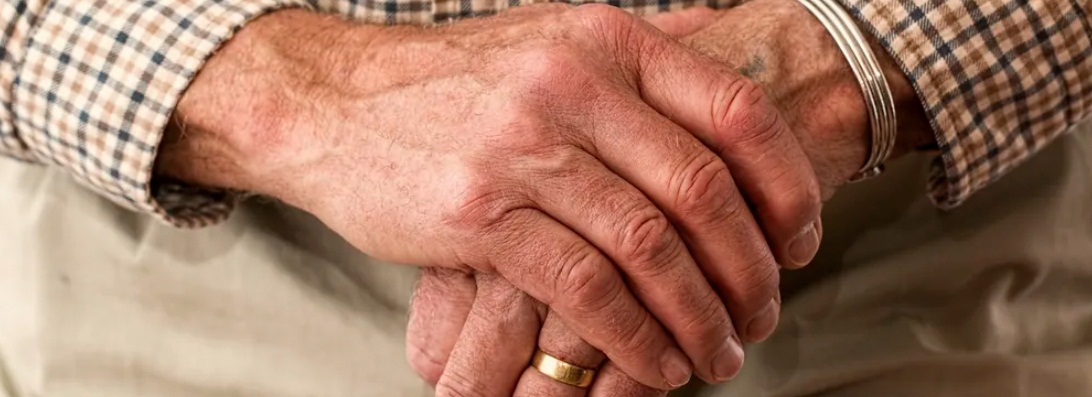
Exact cause of Parkinson’s disease is unknown, but scientists believe that specific genetic mutations lead to the development of the disease. These genetic mutations can be either inherited or triggered by environmental factors such as exposure to toxins and viruses.
Symptoms of Parkinson’s Disease
The four primary symptoms of Parkinson’s disease include:
(1) Tremor or trembling in the hands, arms, legs, or head;
(2) Muscle stiffness or rigidity;
(3) Slow motion (bradykinesia);
(4) Impaired balance or walking.
Tremor is usually the first symptom of Parkinson’s disease. It usually begins on one side of the body, in one arm or leg. Tremor may become worse when the affected part of the body is at rest. Still, not all patients with Parkinson’s disease experience tremors.
As the disease progresses, all body muscles get affected which may lead to constipation and difficulty swallowing. Balance problems also occur. In advanced stages, the patient develops a fixed staring expression, and blinking and smiling are diminished. Speech becomes slow and slurred, and the voice is monotone. Finally, memory problems and loss of mental clarity (dementia) occur as well.
Stages of Parkinson’s Disease
Symptoms of Parkinson’s disease are not the same for each patient. They may be mild or severe and occur frequently or occasionally. Parkinson’s disease can be classified into five stages according to the severity of symptoms.
Stage I
This is the beginning stage of Parkinson’s disease characterized by mild symptoms. Symptoms are typically present on one side of the body and are inconvenient but not disabling. The main symptom in this stage is a tremor in one of the limbs. However, friends and family may notice changes in posture, balance, and facial expression in the patient.
Stage II
This next stage causes bilateral symptoms, meaning that both sides of the body are affected. The affected individual typically experiences problems with walking or maintaining balance. There is a minimal disability that causes difficulty completing everyday physical tasks.
Stage III
At this stage, the patient experiences considerable slowing of movements and impaired ability to walk or stand.
Stage IV
Stage four Parkinson’s disease causes severe symptoms. The patient may still walk but to a limited extent. Muscle rigidity and slow motion are visible but tremor often improves. During this stage, the patient can no longer live alone because of the inability to perform everyday tasks.
Stage V
The last or end stage of Parkinson’s disease is characterized by complete disability since muscle control and movement are lost. The sufferer cannot stand or walk and requires constant nursing care.
- PD affects 17.4 per 100,000 of individuals between the ages of 50-59 and 93.1 people per 100,000 of individuals between the ages of 70-79. The average patient lives 15 years from the time of diagnosis until death.
- There are several therapeutic options for advanced PD patients including intraduodenal levodopa infusion, apomorphine infusion, and deep brain stimulation. They have different profiles and are addressing different PD phenotypes. However, end-stage PD patients, especially if they are cognitively impaired as they often are, exclude them from these therapies.
- Medical interventions are largely ineffective in preventing the inevitable progression of PD since there is always also a possibility of an intercurrent illness. Additionally, there is a high probability of PD patients to become disabled and dependent. PD patients who do not respond to standard treatments require multidisciplinary care that include elements of traditional medicine and holistic care.
- As PD progresses there are fewer dopaminergic neurons in the substantia nigra as well as a progressively lower capacity to store exogenous levodopa and convert it to dopamine for storage and release in the remaining neurons. Additionally, as the dose requirements of levodopa increase, the patient's functioning is inhibited before his next dose of medication.
- Patients with advanced PD often notice that protein-rich meals will diminish the effectiveness of levodopa doses. This can be alleviated by reducing protein intake during daytime and limiting protein intake at night to 40 grams.
- Motor complications in PD consists of motor fluctuations and dyskinesia most probably as a result of the pharmacological treatment. These can be either excessive hypokinesia (e.g. freezing, rigidity, increasing off times, dysphagia, dysarthria, and respiratory compromise) or excessive hyperkinesia (e.g. choreiform and dystonic dyskinesia).
- PD patients can experience freezing of mobility through any movement, but it is most prominent and difficult when this freezing involves gait. Freezing is especially frequent when initiating gait (start hesitation) and when passing through tight spaces such as doorways.
- 80% of PD patients suffer from autonomic dysfunction and it may be a cause of significant morbidity. Autonomic symptom severity in patients with PD seems to correlate with older age, greater disease severity, psychiatric complications, sleep disorders, and higher doses of dopaminergic medication.
- Conspicuous dysautonomias in patients suffering from severe PD include bowel and bladder abnormalities, gastrointestinal disorders, orthostatic hypotension, and sexual dysfunction.




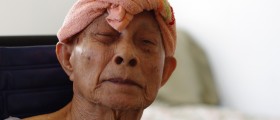

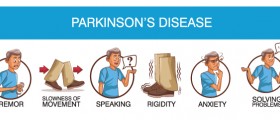


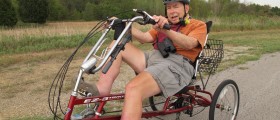





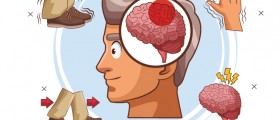

Your thoughts on this
Loading...